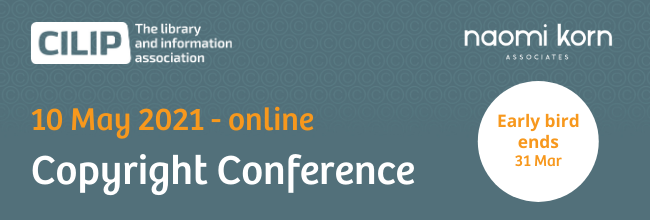
Brexit means a sub-optimal copyright exceptions regime. That means greater risk aversion, more obstacles and more costs for library and information professionals. It could also mean long-term issues for research, AI and innovation in general,
according to Naomi Korn, Managing Director Naomi Korn Associates.
The potential effects effects of Brexit on information sectors were the subject of much speculation after the 2016 referendum. But the target moved as the government shifted from a ‘soft’ option, to signing up for a ‘hard’ Brexit. Naomi Korn
has closely followed the changing stances and their potential impact on intellectual property, copyright and data protection. In particular, the impact of Brexit on the management of orphan works is the focus of a part-time PhD she has
just started at The University of Edinburgh. “There are very clear immediate impacts as well as longer term ones,” she said, “There are two issues of -interest. The first is that the UK can no longer benefit from the EU Orphan Works exception.
The second is the government decision not to implement the EU Copyright Directive which will roll out across the EU in April.”
Not fit for purpose
Naomi said that the UK copyright exceptions regime had been cutting edge in 2014. It went on to form the basis of the EU’s exceptions but “the EU have enhanced exceptions to copyright so they are now better than ours. We lose out on what the
rest of Europe is going to get”. She believes that UK system not being as good as the best is akin to not being fit for purpose. “In terms of some of big data and AI, not having some of the exceptions available in the EU, or having the
option of jumping through the hoops to get those exceptions, is going to be detrimental to some of the really big aspirations. Without an exceptions regime that’s fit for purpose for our NEWS FEATURE current digital environment, and if
there’s not some possibility of movement in the landscape – one that allows us to optimise for future innovations… these will add friction to UK institutions and will be detrimental to UK Plc and to our growth, particularly using innovative
technologies.”

Risk and orphan works
The most immediate problem for the library and information sector is orphan works. Naomi wrote a report in 2009 called In From the Cold which found there were in the region of 50 million orphan works in the UK sector. She said there were probably
a lot more now but, despite their prevalence, the uptake in using the orphan works exception by UK cultural heritage organisations is low: But she said: “The end of the EU exception resulted in different responses. The British Library
has taken Spare Rib offline in response while others, including the BFI and the University of Kent, have kept their Orphan Works online. This highlights that different organisations take different views on risk. There is a big debate to
be had about risk management, particularly as one of the nation’s most significant institutions, the British Library, has decided to take down its orphan works.” She said there were now only three options for UK institutions that want
to make orphan works accessible online. 1. Don’t do it 2. Risk manage it. That means doing a reasonable search to discover if the risk is tolerable. 3. Orphan works licensing scheme – via UK Government. However, it is administratively
arduous and costly. It definitely has short comings and these also include it time limitation and also its lack of international coverage.
None of these, according to Naomi, match the EU IPO Orphan Works Database for ease of access and the coverage of risk. It means more institutions are likely to take option one, and Naomi said: “The issues around this restriction have obviously
been highlighted by Covid-19 where anything that has not been digitally accessible has not been accessible full stop.”
EU Copyright Directive
The second half of Naomi’s case is the decision not to align with the EU Copyright Directive. “At first, UK Government said we would, but then flip-flopped and now it seems that we won’t. We might cherry pick downstream but at the moment we
won’t.” She gave two examples of how the directive will give an edge to EU information professionals. One is through ‘out-of-commerce works’ exceptions – which could “effectively enable the mass digitisation of material to which publishers
are no longer providing access – and placing it online with less resource required.” The other is that UK exceptions enabling text and datamining for non-commercial research but the EU Directive has a provision for commercial research
which Naomi says will be “important for our colleagues in pharma or law”. Naomi concludes that she will be carefully watching this space as part of her on-going research, and the tracking the impact on the UK’s library and cultural heritage
sector.
CILIP has partnered with Naomi Korn Associates on three online events designed to enhance participants copyright knowledge.
Copyright Conference, 10 May (Early Bird discount deadline 31 March)
This year’s online Copyright Conference is an ideal and unique opportunity for all librarians, archivists and information
professionals to update their knowledge and professional practice in this crucial area. Additionally, it will appeal to those who want to update their general copyright, licensing and publishing knowledge.
Advanced Copyright Training, 20/27 May
This detailed two-part online course is designed for anybody responsible for copyright in their organisation, across all library, information and knowledge management sectors.
Copyright Essentials Training, 9/16 September
This fundamental two part online workshop is perfect for anybody who needs an introduction to the basic copyright principles and/or is reproducing, creating, sharing, publishing, commissioning or digitising content.
Naomi Korn Associates: Naomi is one of the cultural heritage and education sectors leading IP and Data Protection experts. Her company, Naomi Korn Associates, has worked for almost 18 years with various clients from across
the sector on operational, policy and strategic approaches to these dynamic and vital issues. Naomi was the Chair of LACA (Libraries and Archives Copyright Alliance) leading the reform of the UK’s copyright laws and she has also been proud
to support CILIP and its membership as a CILIP Trustee. This is Naomi’s eleventh year in developing the successful programme for the CILIP annual Copyright Conference.
Header image: "Banksy does Brexit (detail)" by dullhunk is licensed under CC BY 2.0




